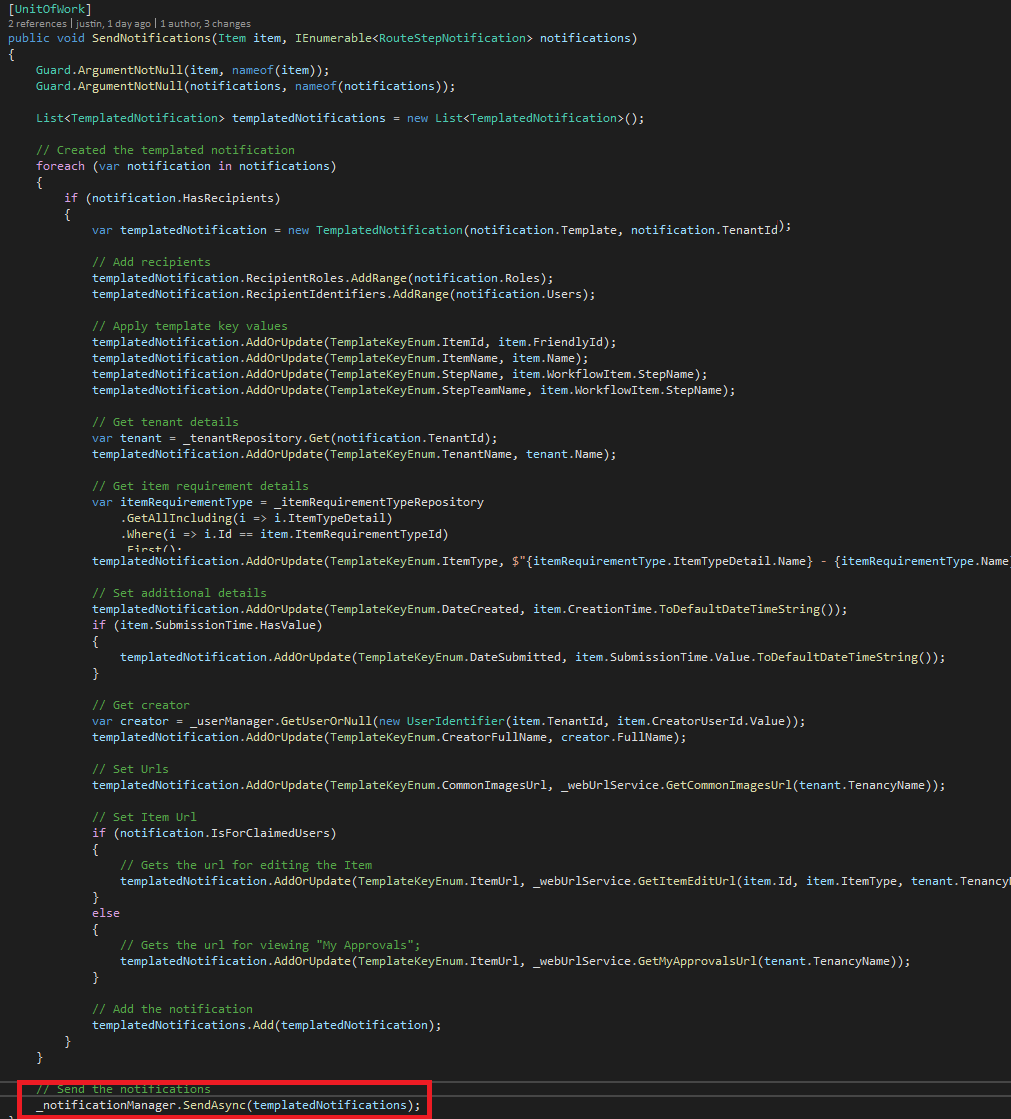Hi,
ABP Version: 5.6 AspNetZero Angular 8.6 .NET Core
I'm using the default BackgroundJobManager, provided by ABP, to enqueue and process background jobs.
I'm enqueuing a background job to send email notifications. However, every second or third attempt to enqueue the job throws the following error:
error occurred while updating the entries. See the inner exception for details. at Microsoft.EntityFrameworkCore.Update.ReaderModificationCommandBatch.Execute(IRelationalConnection connection)
at Microsoft.EntityFrameworkCore.Update.Internal.BatchExecutor.Execute(IEnumerable`1 commandBatches, IRelationalConnection connection)
at Microsoft.EntityFrameworkCore.Storage.RelationalDatabase.SaveChanges(IList`1 entries)
at Microsoft.EntityFrameworkCore.ChangeTracking.Internal.StateManager.SaveChanges(IList`1 entriesToSave)
at Microsoft.EntityFrameworkCore.ChangeTracking.Internal.StateManager.SaveChanges(DbContext _, Boolean acceptAllChangesOnSuccess)
at Npgsql.EntityFrameworkCore.PostgreSQL.Storage.Internal.NpgsqlExecutionStrategy.Execute[TState,TResult](TState state, Func`3 operation, Func`3 verifySucceeded)
at Microsoft.EntityFrameworkCore.DbContext.SaveChanges(Boolean acceptAllChangesOnSuccess)
at Abp.EntityFrameworkCore.AbpDbContext.SaveChanges()
at Abp.Zero.EntityFrameworkCore.AbpZeroCommonDbContext`3.SaveChanges()
at Abp.EntityFrameworkCore.Uow.EfCoreUnitOfWork.SaveChangesInDbContext(DbContext dbContext)
at Abp.EntityFrameworkCore.Uow.EfCoreUnitOfWork.SaveChanges()
at Abp.EntityFrameworkCore.Uow.EfCoreUnitOfWork.CompleteUow()
at Abp.Domain.Uow.UnitOfWorkBase.Complete()
at RMS.Workflow.WorkflowAppService.SubmitAsync(ItemActionRequestDto request) in C:\Development\IDS\RMS\Main\src\RMS.Workflow\Workflow\WorkflowAppService.cs:line 278
at Abp.Authorization.AuthorizationInterceptor.InternalInterceptAsynchronous(IInvocation invocation)
at Abp.Domain.Uow.UnitOfWorkInterceptor.InternalInterceptAsynchronous(IInvocation invocation)
at Abp.Domain.Uow.UnitOfWorkInterceptor.InternalInterceptAsynchronous(IInvocation invocation)
at Abp.Auditing.AuditingInterceptor.InternalInterceptAsynchronous(IInvocation invocation)
at Abp.Auditing.AuditingInterceptor.InternalInterceptAsynchronous(IInvocation invocation)
at Abp.Runtime.Validation.Interception.ValidationInterceptor.InternalInterceptAsynchronous(IInvocation invocation)
at RMS.Items.ItemAppService.SubmitAsync(ItemActionRequestDto request) in C:\Development\IDS\RMS\Main\src\RMS.Application\Items\ItemAppService.cs:line 188
at Abp.Authorization.AuthorizationInterceptor.InternalInterceptAsynchronous(IInvocation invocation)
at Abp.Domain.Uow.UnitOfWorkInterceptor.InternalInterceptAsynchronous(IInvocation invocation)
at Abp.Domain.Uow.UnitOfWorkInterceptor.InternalInterceptAsynchronous(IInvocation invocation)
at Abp.Auditing.AuditingInterceptor.InternalInterceptAsynchronous(IInvocation invocation)
at Abp.Runtime.Validation.Interception.ValidationInterceptor.InternalInterceptAsynchronous(IInvocation invocation)
at lambda_method(Closure , Object )
at Microsoft.Extensions.Internal.ObjectMethodExecutorAwaitable.Awaiter.GetResult()
at Microsoft.AspNetCore.Mvc.Infrastructure.ActionMethodExecutor.AwaitableResultExecutor.Execute(IActionResultTypeMapper mapper, ObjectMethodExecutor executor, Object controller, Object[] arguments)
at Microsoft.AspNetCore.Mvc.Infrastructure.ControllerActionInvoker.<InvokeActionMethodAsync>g__Awaited|12_0(ControllerActionInvoker invoker, ValueTask`1 actionResultValueTask)
at Microsoft.AspNetCore.Mvc.Infrastructure.ControllerActionInvoker.<InvokeNextActionFilterAsync>g__Awaited|10_0(ControllerActionInvoker invoker, Task lastTask, State next, Scope scope, Object state, Boolean isCompleted)
at Microsoft.AspNetCore.Mvc.Infrastructure.ControllerActionInvoker.Rethrow(ActionExecutedContextSealed context)
at Microsoft.AspNetCore.Mvc.Infrastructure.ControllerActionInvoker.Next(State& next, Scope& scope, Object& state, Boolean& isCompleted)
at Microsoft.AspNetCore.Mvc.Infrastructure.ControllerActionInvoker.<InvokeInnerFilterAsync>g__Awaited|13_0(ControllerActionInvoker invoker, Task lastTask, State next, Scope scope, Object state, Boolean isCompleted)
at Microsoft.AspNetCore.Mvc.Infrastructure.ResourceInvoker.<InvokeNextExceptionFilterAsync>g__Awaited|25_0(ResourceInvoker invoker, Task lastTask, State next, Scope scope, Object state, Boolean isCompleted)
23505: duplicate key value violates unique constraint "PK_AbpBackgroundJobs" at Npgsql.NpgsqlConnector.<>c__DisplayClass160_0.<<DoReadMessage>g__ReadMessageLong|0>d.MoveNext()
--- End of stack trace from previous location where exception was thrown ---
at Npgsql.NpgsqlConnector.<>c__DisplayClass160_0.<<DoReadMessage>g__ReadMessageLong|0>d.MoveNext()
--- End of stack trace from previous location where exception was thrown ---
at Npgsql.NpgsqlDataReader.NextResult(Boolean async, Boolean isConsuming)
at Npgsql.NpgsqlDataReader.NextResult()
at Npgsql.NpgsqlCommand.ExecuteReaderAsync(CommandBehavior behavior, Boolean async, CancellationToken cancellationToken)
at Npgsql.NpgsqlCommand.ExecuteReader(CommandBehavior behavior)
at Microsoft.EntityFrameworkCore.Storage.RelationalCommand.ExecuteReader(RelationalCommandParameterObject parameterObject)
at Microsoft.EntityFrameworkCore.Update.ReaderModificationCommandBatch.Execute(IRelationalConnection ]connection) Severity: ERROR;InvariantSeverity: ERROR;SqlState: 23505;MessageText: duplicate key value violates unique constraint "PK_AbpBackgroundJobs";Detail: Key ("Id")=(6) already exists.;SchemaName: public;TableName: AbpBackgroundJobs;ConstraintName: PK_AbpBackgroundJobs;File: d:\pginstaller_12.auto\postgres.windows-x64\src\backend\access\nbtree\nbtinsert.c;Line: 570;Routine: _bt_check_unique"
As you can see, it looks the BackgroundJobManager is trying to re-insert a job entry with the same ID.
Below is how I'm enqueueing the job:
/// <summary>
/// Sends the collection of templated notifications
/// </summary>
/// <param name="notifications"></param>
/// <returns></returns>
public async Task SendAsync(IEnumerable<TemplatedNotification> notifications)
{
foreach(var notification in notifications)
{
// Enqueue the job
await _backgroundJobManager.EnqueueAsync<SendTemplatedNotificationJob, TemplatedNotification>(notification);
}
}
Below is the background job definition:
public class SendTemplatedNotificationJob : BackgroundJob<TemplatedNotification>, ITransientDependency
{
#region Constructors
public SendTemplatedNotificationJob(
IEmailSender emailSender,
IRepository<NotificationTemplate> notificationTemplateRepository,
UserManager userManager
)
{
Guard.ArgumentNotNull(emailSender, nameof(emailSender));
Guard.ArgumentNotNull(notificationTemplateRepository, nameof(notificationTemplateRepository));
Guard.ArgumentNotNull(userManager, nameof(userManager));
_emailSender = emailSender;
_notificationTemplateRepository = notificationTemplateRepository;
_userManager = userManager;
AbpSession = NullAbpSession.Instance;
}
#endregion
#region Properties
public IAbpSession AbpSession { get; set; }
#endregion
#region Fields
private readonly IEmailSender _emailSender;
private readonly IRepository<NotificationTemplate> _notificationTemplateRepository;
private readonly UserManager _userManager;
#endregion
#region Methods
/// <summary>
/// Sends the specified notification
/// </summary>
/// <param name="notification"></param>
[UnitOfWork]
public override void Execute(TemplatedNotification notification)
{
// TODO: Cater for other notification channels, besides email
if(notification != null)
{
// Switch to correct tenant
using (CurrentUnitOfWork.SetTenantId(notification.TenantId))
{
// Set the session
using (AbpSession.Use(notification.TenantId, null))
{
// Get the template
var template = _notificationTemplateRepository.FirstOrDefault(t => t.Code == notification.TemplateCode);
if (template == null)
{
// Try to get the non-tenant template
using (CurrentUnitOfWork.DisableFilter(AbpDataFilters.MayHaveTenant))
{
template = _notificationTemplateRepository.FirstOrDefault(t => t.Code == notification.TemplateCode);
}
}
if (template != null)
{
// First build the list of recipients
HashSet<string> recipients = new HashSet<string>();
// Get recipients by user identifier
foreach (var userIndentifier in notification.RecipientIdentifiers)
{
var user = _userManager.GetUserOrNull(userIndentifier);
if (!string.IsNullOrWhiteSpace(user?.EmailAddress))
{
recipients.Add(user.EmailAddress);
}
}
// TODO: Get recipients by role
if (recipients.Any())
{
// Build template body
StringBuilder body = new StringBuilder(template.Body);
foreach (var key in notification.TemplateKeyValues.Keys)
{
body.Replace($"<%{key}%>", notification.TemplateKeyValues[key] ?? string.Empty);
}
// Construct mail message
MailMessage mailMessage = new MailMessage();
recipients.ForEach(r => mailMessage.To.Add(r));
mailMessage.Subject = template.Subject;
mailMessage.Body = body.ToString();
mailMessage.IsBodyHtml = true;
// Send the email
_emailSender.Send(mailMessage);
}
}
}
}
}
}
#endregion
}
Thanks
5 Answer(s)
-
0
Hi @Siyeza
Do you run single instance for your app ?
-
0
Hi,
Yes, we're hosting the application in a single docker container. I also get this error when running the application locally on my development machine.
We're also using the database per tenant architecure, but I don't think this is the issue because as far as I can tell the background jobs are always created in the host DB.
Thanks
-
0
Hi,
Apologies, I think I've found the issue. The method I'm calling to enqueue the job is an async method, and I was calling it in n non-async method. I thought Visual Studio would produce a compiler warning for this but it doesn't.
Calling BackgroundJobManager.EnqueueAsync in a non-async method can produce unexpected results, because BackgroundJobManager is a singleton, which means the IBackgroundJobStore can end up participating in multiple, unrelated UnitOfWorks. This can result in multiple in UnitOfWorks trying to insert the same job, depending on thread timing.
Apologies, again.
-
0
Thanks for the warning @Siyeza.
Is that solves your problem?
AsyncHelper.RunSync(() => /*your code*/); -
0
Hi,
Yes it does, thank you.
